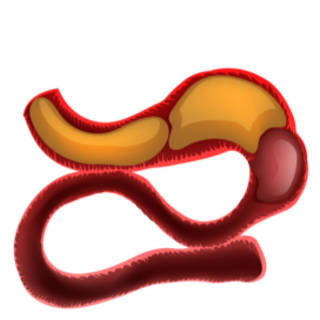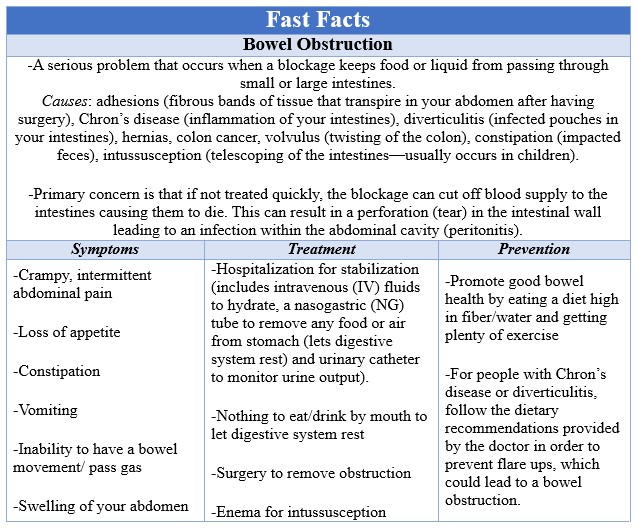What happens when you can’t go?
You have probably been constipated at some point during your life, but eventually you’re able to go to the bathroom and the relief that provides is more satisfying than many of us would ever admit. What happens though if you are unable to go at all? What happens if your intestine becomes blocked and you are unable to have bowel movement?
 Definition
Definition
A bowel obstruction is far more serious than constipation. It is a serious problem that occurs when a blockage keeps food or liquid from passing through small intestines or large intestines. The symptoms of bowel obstruction include crampy, intermittent abdominal pain, loss of appetite, constipation, vomiting, inability to have a bowel movement/pass gas and swelling of your abdomen. There are numerous causes adhesions (fibrous bands of tissue that transpire in your abdomen after having surgery), Chron’s disease (inflammation of your intestines), diverticulitis (infected pouches in your intestines), hernias (part of your intestines protrude and become trapped in an area, such as through weakened abdominal muscles), colon cancer, volvulus (twisting of the colon), constipation (impacted feces), intussusception (telescoping of the intestines—usually occurs in children). The primary concern is that if not treated quickly, the blockage can cut off blood supply to the intestines causing them to die. This can result in a perforation (tear) in the intestinal wall leading to an infection within the abdominal cavity (peritonitis). This is life-threatening and needs emergency medical treatment (usually surgery). Note: another condition that mimics that of a blockage, but has no physical obstruction is called a pseudo-obstruction (paralytic ileus). This is usually from muscle or nerve disruption causing normal coordinated muscle contractions of the intestines to slow or stop.
Treatment
The treatment for most bowel obstructions requires hospitalization to stabilize the person. Stabilization includes intravenous (IV) fluids to hydrate you, a nasogastric (NG) tube to remove any food or air from your stomach (lets your digestive system rest) and urinary catheter to monitor your urine output. In addition, your doctor will probably keep you on a restricted diet and not allow you to have anything to eat by mouth until after the obstruction is cleared. If you have a partial obstruction (some feces can still pass), you probably will not need any further treatment than being stabilized (if your obstruction doesn’t clear on its own, you’ll need surgery to have it removed). Your doctor will recommend a low-fiber diet while waiting for the blockage to clear in order to not stress your intestines. If you have a complete blockage, you will need surgery to remove it after you’ve been stabilized. The type of surgery depends on where the blockage is, but generally involves removing the obstruction and any dead tissue. For a pseudo-obstruction, you will need to be monitored in the hospital to treat the cause (if known). Usually, they improve on their own, but if not, there are medicines that you can take to increase muscle contractions in your intestines (surgery is rarely needed to fix it). For children with intussusception, the treatment involves given an enema of either air or fluid in order to push the intestines back into place.
Prevention
The main technique for preventing bowel obstructions is to eat a healthy diet that is high in fiber. This helps to maintain your bowel regularity and prevents constipation. For people who have Chron’s disease or diverticulitis, it is important to follow the dietary recommendations that your doctor gives you in order to prevent flare ups of the condition that can lead to a bowel obstruction. Getting plenty of exercise and drinking sufficient amounts of water throughout the day also promotes good bowel health.
A bowel obstruction is a serious, life-threatening condition that should not be ignored. If you have any questions, please speak with your doctor. If you would like more information, please visit MedlinePlus’ intestinal obstruction page at https://medlineplus.gov/intestinalobstruction.html